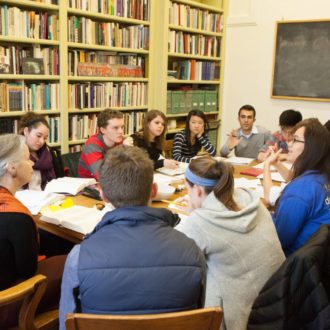
My fellow A.B. sophomores, this post is directed at you (not my already-declared B.S.E friends). Whether you feel like your time at Princeton has dragged on or flown by, we now find ourselves at a crossroads. Next semester, we commit ourselves to something in a way that we have never quite done before: we declare a concentration.
Sophomores are generally in one of several stages with regard to major declaration by this point in the year. Some are dead set on a particular concentration. Others are relatively confident about which department they’ll choose, with some degree of uncertainty. Others still are rather split between or amongst several departments. And finally, a portion of the class might have very little idea about what they’ll choose in April. I personally find myself somewhere in between the second and third groups above. I’m deciding between a concentration that is comfortable and familiar to me, and one that would present more of an academic stretch–I haven’t taken many classes in the department, and in general, know less about the subject.
So, for those of us with several major options on the table, some narrowing needs to happen. How are we to do this? I begin with the unoriginal suggestion that sophomores use the upcoming spring term to take courses in several of their top-choice departments. I add to this, though, by suggesting that sophomores carefully choose representative courses in each of their departments of interest, so that they may gain an accurate picture of what academic life is like in that department.
There are a host of variables that determine how representative a course is of a department, or even of your potential track within a department. How large is the course relative to most departmentals? Is the topic very specific, or rather broad, and how does that correspond with your potential research interests? Is the professor a standout in their department, or will later professors’ lectures/research areas also interest you?
My fellow PCUR Rafi offers the following insight, “[Keep in mind that] if you study Comparative Literature, you’re going to study German and French Literature. So, you should probably take a course in German or French Lit before deciding to study Comp Lit.” While the specifics will change depending on your potential majors, Rafi’s basic idea remains: know what you’re getting yourself into.
Consider two Economics courses: ECO 100 and ECO 310. The first is a survey of microeconomics, the other a more advanced study of the same topic. One might think that since they’re both ECO courses, either one could serve as a representative sample of the Economics major. However, the significant mathematical differences between the two courses undercut this line of reasoning. Simply put, your experience in an introductory survey course might differ significantly from a mid or upper-level departmental; so, when selecting courses for the spring with the intent of deciding on a major, be sure that your chosen course will accurately reflect future courses in that department. Talking to professors or upperclassmen friends in various departments can be a great way to ascertain what courses are fair samples of later required courses and independent work.
Simple as my suggestions may be, I hope that sophomores find them useful as we approach course selection for the upcoming term. If you’re undecided about what you want to study, now is the time to look for courses that are genuinely representative of several departments. You might also find it beneficial to consult departmental independent work guides. A concentration is about you, and what kind of work you want to devote a large chunk of your next several years to. So I suggest that each of us seize this last opportunity to gain an accurate picture of life as a ___ major, and choose spring courses accordingly.
— Shanon FitzGerald, Social Sciences Correspondent

